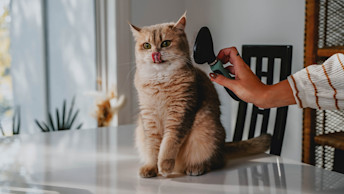January 21, 2022
How to Groom a Cat at Home

While many people think of cats as low-maintenance pets who require the odd brush and trim, the truth is your cat can benefit greatly from a regular grooming regime.
Cats like to play, get dirty, not to mention the constant nail and hair growth. Regularly groom your furry feline to avoid expensive groomer costs and to keep them healthy and happy! Here's our top tips on how to groom a cat at home safely and effectively.
What You'll Need for Cat Grooming at Home
The process of grooming your cat should be fun for you and for them. Using the right tools designed for your type of cat will ensure a pleasant experience for both pet and owner.
Cat Grooming Check List:
- Cat brush
- Cat nail clippers
- Towel
- Shampoo for cats
- Cloth
- Cotton balls
- Cat toothbrush
- Cat toothpaste
- Paw balm
1. Brushing Your Cat's Fur
Cats need regular brushing several times a week to keep their coats looking spick and span. This will help remove dirt and tangles to prevent matting, while spreading healthy oils throughout their coat, keeping their skin and fur healthy and rid of irritation.
Grooming is also one of the best ways to monitor your cat’s health, alerting you to ticks, small wounds, lumps, and skin problems. If your cat has itchy skin or a dull coat, be sure to check in with your veterinarian to identify the cause.

Recommended Solution
Healthy Skin + Coat Cat Food Recipes
Cats of all ages can suffer from dry and itchy skin or lackluster coats, which is why our Skin + Coat Care cat food recipes use premium-quality ingredients rich in omega-3 fatty acids to help keep your cat looking and feeling their best.
View Skin + Coat Care cat food
2. Nail Trimming
Your cat’s claws are often something you don’t think about until you get a sharp reminder that they’re too long. Cat claws, especially indoor cats, need regular trimming – preferably before a bath to protect you from unnecessary scratches. The purpose of trimming is not only to save your furniture but to help him or her avoid the pain of having sore, broken claws.
To remove the sharp tips, you’ll need specific cat clippers to do the trick. When trimming the claws back, ensure you are not getting too close to the pink part of the nail called "the quick," where blood vessels and nerve endings lie. Just like the pink part of a human fingernail, the quick is very sensitive; cutting into this area will likely cause bleeding and pain1.

3. Bathing
Cats have built-in grooming tools in the form of their tongue and teeth, so regular grooming by brushing is usually sufficient. There may come a time when they’ll need a little extra help if he or she has encountered something sticky or smelly.
Most cats hate bathing and will find the process stressful, so make sure you do it right – and only if necessary. Prepare yourself by having the right tools and supplies ready. Then begin by gently placing them inside the sink or tub with warm water. Then using the proper cat specific shampoo, gently lather, rinse and dry.
4. Eyes, Ears, and Paw
Every time you bathe your cat you should make it a priority to clean their face including eyes, ears and even their paws. Look to see that the eyes are clear of any irritates and then gently dampen a cloth and wipe downwards.
Before cleaning the ears check that the area is clean with no wax buildup, smell, and will look a pale pink on the inside. Dampen a cloth to clean the outer ear flaps and a cotton ball for the inners as it's much softer and less harmful as opposed to a tip.
Cats need healthy feet to scratch, climb and hit their landings. Regularly examine and clean your cat’s paws gently with a cloth and use paw balm when necessary.
5. Brushing Teeth
Like us, cats need daily dental care to help decrease plaque and tartar build up. When it comes to brushing, there are specifically designed brushes and flavoured toothpastes that can make the process appetizing. Ensure you are staying away from human products as they are not designed for felines. Knowing how to care for your cat’s teeth is imperative to their overall grooming and health.
In Summary
Remember, grooming a cat takes time! No two cats are the same and each grooming routine will vary based on breed and hair type. Make sure the products you’re using are created for cats and not humans. If done the right way, it can be therapeutic for both you and your feline and should be a positive way to enhance the bond between you. Just remember, a clean cat is a happy and healthy cat!



